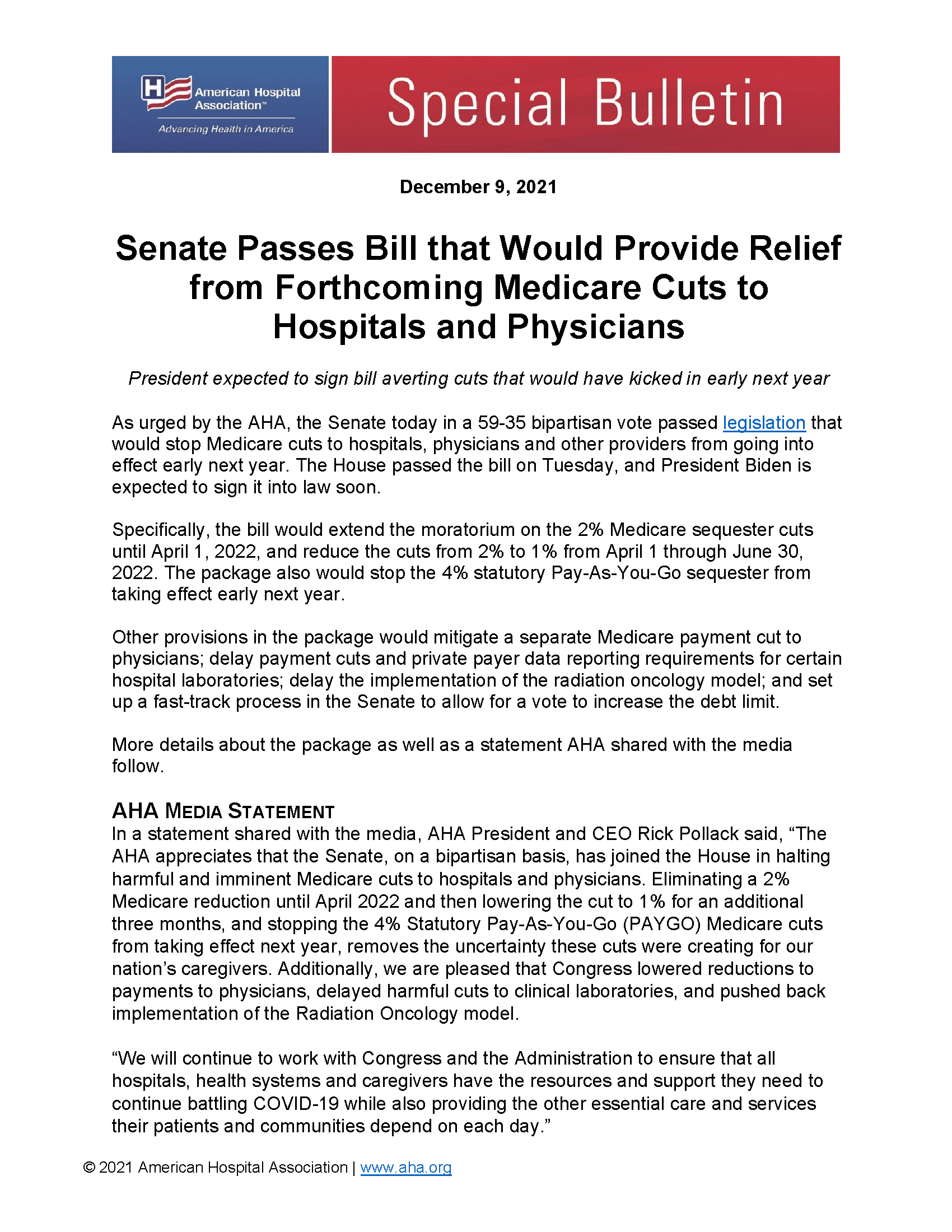

Senate Passes Bill that Would Provide Relief from Forthcoming Medicare Cuts to Hospitals and Physicians
Special Bulletin
December 9, 2021
President expected to sign bill averting cuts that would have kicked in early next year
As urged by the AHA, the Senate today in a 59-35 bipartisan vote passed legislation that would stop Medicare cuts to hospitals, physicians and other providers from going into effect early next year. The House passed the bill on Tuesday, and President Biden is expected to sign it into law soon.
Specifically, the bill would extend the moratorium on the 2% Medicare sequester cuts until April 1, 2022, and reduce the cuts from 2% to 1% from April 1 through June 30, 2022. The package also would stop the 4% statutory Pay-As-You-Go sequester from taking effect early next year.
Other provisions in the package would mitigate a separate Medicare payment cut to physicians; delay payment cuts and private payer data reporting requirements for certain hospital laboratories; delay the implementation of the radiation oncology model; and set up a fast-track process in the Senate to allow for a vote to increase the debt limit.
More details about the package as well as a statement AHA shared with the media follow.
AHA Media Statement
In a statement shared with the media, AHA President and CEO Rick Pollack said, “The AHA appreciates that the Senate, on a bipartisan basis, has joined the House in halting harmful and imminent Medicare cuts to hospitals and physicians. Eliminating a 2% Medicare reduction until April 2022 and then lowering the cut to 1% for an additional three months, and stopping the 4% Statutory Pay-As-You-Go (PAYGO) Medicare cuts from taking effect next year, removes the uncertainty these cuts were creating for our nation’s caregivers. Additionally, we are pleased that Congress lowered reductions to payments to physicians, delayed harmful cuts to clinical laboratories, and pushed back implementation of the Radiation Oncology model.
“We will continue to work with Congress and the Administration to ensure that all hospitals, health systems and caregivers have the resources and support they need to continue battling COVID-19 while also providing the other essential care and services their patients and communities depend on each day.”
Health Care Provisions Included in Legislative Package
Relief from 2% Medicare Sequester
The bill would eliminate for three months the 2% Medicare sequester cuts on hospitals and others providers that are scheduled to resume Jan. 1, 2022. In addition, the legislation would reduce the 2% sequester cut to 1% from April 1, 2022 through June 30, 2022. The package would be paid for by increasing the sequester percentage in 2030. See the AHA fact sheet for more details on the 2% cut.
Halting Statutory PAYGO Sequester for 2022
The bill would stop the 4% PAYGO sequester from taking effect early next year. Any cuts mandated by a sequester order for the 2022 “PAYGO scorecard” would be delayed and added to the “2023 scorecard.” This does mean Congress will need to take action in late 2022 to eliminate these cuts. The Congressional Budget Office has estimated that a Statutory PAYGO sequester in fiscal year 2022 resulting from passage of the American Rescue Plan Act of 2021 would cause a 4% reduction in Medicare spending – or cuts of approximately $36 billion. Failure to waive Statutory PAYGO would result in $9.4 billion in cuts to hospital providers. See the AHA fact sheet for more details.
Mitigating a 3.75% Physician Payment Cut
The bill would mitigate the 3.75% payment cut to Medicare Physician Fee Schedule (PFS) payments finalized for calendar year 2022 by implementing a one-year, 3% increase to the PFS conversion factor. Specifically, the Consolidated Appropriations Act of 2021 provided a 3.75% increase to the PFS conversion factor only for CY 2021. With that increase set to expire on Dec. 31, 2021, this bill would provide a 3% bump to the conversion factor for next year, CY 2022. The AHA and others have urged CMS to work with Congress to maintain the increase to the conversion factor.
One-year Delay of Clinical Lab Cuts
The bill would delay for one year (until Jan. 1, 2023) payment cuts under the Clinical Laboratory Fee Schedule (CLFS). Congress last year delayed the implementation of CLFS cuts as part of the Coronavirus Aid, Relief, and Economic Security Act, but without additional action laboratories are scheduled to see cuts as large as 15% to some of the most common tests on their menus. The bill also would delay by one year (until Jan. 1, 2023) the requirements that certain hospital laboratories report their private payer clinical laboratory test codes, payments and volume data. The AHA and others have pushed for these cuts and data reporting requirements to be delayed.
Delay Implementing Radiation Oncology Model
The package would delay for one year (until Jan. 1, 2023) the implementation of the radiation oncology model. The AHA had urged CMS to delay the model start date to Jan. 1, 2023 to give the model and its participants the best chance to truly improve cancer care and patient outcomes.
Further Questions
If you have questions, please contact AHA at 800-424-4301.


